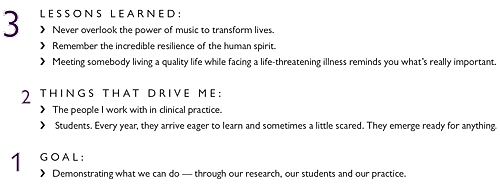Sandi Curtis puts music therapy program on world stage
The President’s Report 2011 presents the highlights of the past academic year under the theme Big Thinking Adds Up, Strength in Numbers. The publication, now available online, presents profiles of six Concordians who are making invaluable contributions in their respective fields. Read more about the work of Sandi Curtis below.

As a music therapist, Sandi Curtis understands the importance of hands-on experience. So, when she was invited to add music therapy to Concordia’s Department of Creative Arts Therapies, she incorporated 1,200 hours of practical experience into her curriculum.
Developing a network of placement opportunities was key for the program’s success. Students spend three or four days a week practising music therapy in daycares, schools, hospitals or community centres. This practical component, under close faculty supervision, makes the certificate program unique in Canada. She also developed a master’s degree for students interested in research opportunities.
The music therapy program teaches students to help people express themselves through music, regardless of physical ability, skill level or life situation. Students learn how to help the individuals they work with build confidence and community.
Through her research, Curtis has demonstrated the healing power of music for a variety of populations in different contexts, for instance, improving quality of life and providing pain relief and relaxation for people in palliative care. The results of the three-year study she conducted led to similar projects in Australia.
Recently, she has been working with women and children who have survived violence. Offering a safe, therapeutic context for self-expression is an important component of these programs.
“So often, they have been silenced. Music gives them a voice.”
Curtis is also developing music therapy projects for people with disabilities. “Many programs (directed at these communities) focus on life skills; on getting jobs or apartments. We want to offer more than just the right to live.”

Related link:
• President’s Report 2011